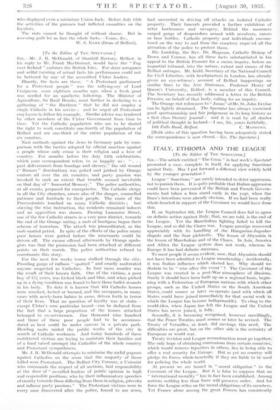[To the Editor of THE: SPECTATOR,]
Sta,—Mr. J. R. McDonald, of Shankill Rectory, Belfast, in his reply to Mr. Frank MacDermot, would have the " Fog over Ireland " embrace the British' Isles. For sheer arrogance and wilful twisting of actual facts his performance could not be bettered by any of the accredited Ulster leaders.
Bluntly, the facts are these. " A Protestant parliament for a Protestant people " was the rallying-cry of Lord Craigavon, some eighteen months ago, when a fresh goad was needed for an apathetic following. The Minister of Agriculture, Sir Basil. Brooke, went further in declaring to a gathering of " the Brethren " that lie did not employ a single Catholic in his service ; and he urged all Protestant emr loyers to follow his example. Similar advice was tendered by other members of the Ulster Government from time to time. Yet the Catholic population who are to be denied the right to work constitute one-fourth of the population of Belfast and are one-third of the entire population of the six counties.
Nazi methods against the Jews in Germany pale by com- parison with the tactics adopted by official sanction against a people whose only crime is their religion and a love of country. For months before the July 12th celebrations, which your correspondent refers to so happily as : " . . . past deliverances from bondage and slavery," the old wound (" Roman " domination) was poked and jabbed by Orange orators all over the six counties, and party 'passion was invoked to such an extent that trouble seemed inevitable on that day of " Immortal Memory." The police authorities, at all events, prepared for emergencies. The Catholic clergy, in all the City churches, aware also of the danger, counselled Patience and fortitude to their people. The route of the Proeessionists touched on many Catholic districts ; but obeying the wise instruction, the residents remained indoors. and no opposition was shown. Passing Lancaster Street, One of the few Catholic streets in a very poor district, towards the end of the Orange outing, a mob of hooligans began their scheme of terrorism. The attack was premeditated, as the mob carried petrol. In spite of the efforts of the police many poor homes were gutted before the miscreants could be driven off. The excuse offered afterwards by Orange apolo- gists was that the proCession had been attacked at different points on their march. The police authorities refused to corroborate this story.
For the next few weeks terror stalked through the city. Prowling gangs of ruffians " spotted " and cruelly maltreated anyone suspected as Catholics. In four cases murder was the result of their known faith. One of the victims, a poor boy of 151 years, was kicked black and blue, and when picked up in a dying condition was found to have three bullet wounds in his body. To date it is known that 434 Catholic homes were wrecked, looted or burned, and the occupants, in many cases with newly-born babies in arms, driven forth in terror of their lives. That no question of loyalty was at stake— except Ulster's own' particular brand—can be deduced from the fact that a large proportion of the homes attacked belonged to ex-serviceinen. One thousand nine hundred and three of these poor people had to be accommo- dated as best could be under canvas in a private park. Howling mobs raided the public works of the city in search of Catholic workmen. And today hundreds of these embittered victims are trying to maintain their families out of a fund raised amongst the CatholiCs of the whole country and Protestant sympathisers.
Mr. J. R. McDonald attempts to minimise the awful pogrom against Catholics on the score that the majority of those killed were Protestant. The Belfast City Coroner, a Unionist who commands the respect of all sections, laid responsibility at the door of " so-called leaders of public opinion in high and responsible positions, who by their inflammatory speeches of enmity towards those differing from them in religion, 0:woke and inflame party passions." The Protestant victims were in every case discovered after the police, forced to use arms,
had succeeded in driving off attacks on isolated Catholic property. . Their funerals provided a further exhibition of utter lawlessness and savagery. Behind the mourners surged gangs of desperadoes armed with revolvers, razors or beer bottles. Catholic property and individuals encoun tered on the way to and from the cemetery requi2ed all the attention of the police to protect them.
His Lordship, the Rev. Dr. Magecan, Catholic Bishop of Down and Connor, has all these facts substantiated in his appeal to the British Premier for a sworn inquiry, before an impartial tribunal, into the nature, extent and causes of the Belfast outrages. Mr. Kidd, Secretary of the National Council for Civil Liberties, with headquarters in London, has already
given an eye-witness's account of Belfast happenings on similar lines to the New Statesman. Professor Henry of
Queen's University, Belfast, is a member of this Council. The Secretary has recently addressed a letter to the British Premier, on behalf of that body, calling for an inquiry.
The Orange riot references to " Janus" of Mr. St. John Ervine can be lightly dismissed. The Spectator has always exercised good sportsmanship and fair judgement in its long history as a first class literary journal ; and it is read by all shades of political thought in Ireland.—I am, Sir, yours faithfully, 108 Palls Road, Belfast. . C. MATHEWS. . [Both sides of this question having been adequately stated the correspondence is now closed.—En. The Spectator.]


































 Previous page
Previous page